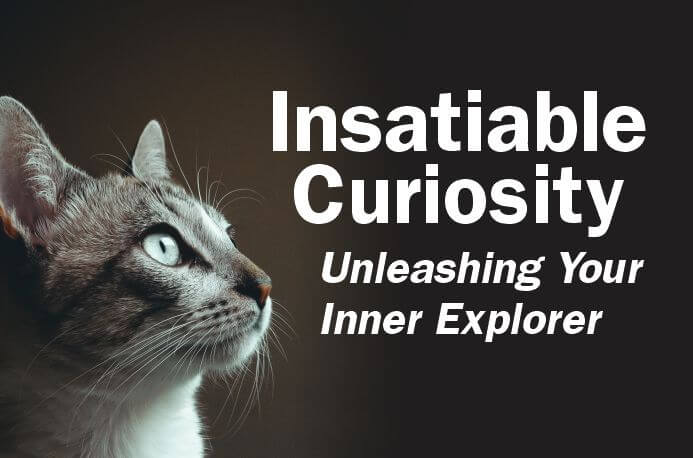Last updated on April 4th, 2025 at 06:23 am
Ignite your insatiable curiosity and embark on a thrilling journey of self-discovery as you unleash your inner explorer and uncover hidden treasures of life.
Many of the greatest minds throughout history have been known for their unflinching curiosity and their relentless pursuit of knowledge and balance in the pillars of life.
This type of curiosity can drive the mind and make us achieve what we never thought capable of.
Every invention and technological advancement we have witnessed was driven by curious minds.
Everyone has a kind of curiosity in them that can be triggered in the right environment.
I have always been curious about nature and life, always in awe at the intricacies and consistency thereof, maybe not curious enough to be insatiable though.
This article is going to examine what insatiable curiosity is, its benefits and how it drives personal growth and innovation, and how to cultivate it and its pitfalls.
Table of Contents
- Insatiable Curiosity Meaning
- Importance of Curiosity
- Benefits of Having a Curious Mind
- Examples of Successful People Who Possess Insatiable Curiosity
- Pitfalls of Extreme Curiosity
- Tips for Cultivating Curiosity
- Conclusion
- Frequently asked questions
Insatiable Curiosity Meaning
Insatiable curiosity is a deep and relentless desire to learn and understand more about the world and its workings.
It is a driving force that compels individuals to seek out new information, ask questions, and explore the unknown, even when there is no apparent practical benefit to doing so.
People with this type of curiosity are never satisfied with what they already know, and they constantly seek out new knowledge and experiences to expand their understanding of the world.
They tend to be naturally curious and have a sense of wonder about the world around them, which fuels their desire to explore and learn more.
Importance of Curiosity

When you have an unflinching curiosity, you are always asking questions, seeking answers, and exploring new ideas and perspectives. This can lead to a number of benefits, both personally and professionally.
Here are ways insatiable curiosity can be important:
- Expand knowledge and understanding: It can help you to expand your knowledge and deepen your understanding of the world around you. By constantly seeking out new information and ideas, you can become a more knowledgeable and well-rounded person.
- Promote open-mindedness and adaptability: It can help you to stay open-minded and adaptable. When you are constantly seeking new information and perspectives, you are more likely to be able to adapt to new situations and respond to changing circumstances in a flexible and effective way.
- Can fuel innovation and creativity: When you are constantly seeking out new ideas and approaches, you are more likely to come up with innovative solutions to problems and find new ways of doing things.
- Can lead to personal growth and fulfillment: When you are constantly learning and exploring, you are more likely to find meaning and purpose in your life, and to develop a sense of personal fulfillment and satisfaction.
Related: Fake It Till You Make It: The Pros and Cons
Benefits of Having a Curious Mind

Having a curious mind of course has many benefits for humanity including the following:
1. Improved problem-solving skills: Curiosity enhances problem-solving skills by promoting a growth mindset. It drives individuals to explore problems thoroughly, think critically, and persist in the face of challenges.
2. Increased creativity: Being very curious can increase creativity in several ways. When you are curious, you are more likely to explore new ideas, seek out new information, and try new things. This exploration and experimentation can lead to unique and innovative solutions to problems or challenges, which is a key aspect of creativity.
Related: How To Improve Intuition And Attune With The Infinite
3. A Better understanding of the world and other people: Curiosity encourages a deeper understanding of the world and others by encouraging questioning, seeking new information, and approaching situations with an open mind. In general, extreme curiosity can be a powerful tool for promoting a better understanding of the world and other people.
It encourages learning, empathy, critical thinking, cultural competence, and personal growth, all of which can contribute to a richer and more fulfilling life.
Related: How To Master Your Sense Of Agency
4. More satisfying relationships: It can promote satisfying relationships in several ways. When you are curious about others, you are more likely to ask questions, actively listen, and show genuine interest in their lives. This can lead to deeper connections, greater empathy, and more meaningful relationships.
5. Enhanced sense of purpose and meaning in life: Being curious enough can enhance your sense of purpose and meaning in life in a number of ways. When you are curious, you are more likely to seek out new experiences, ideas, and challenges, which can provide a sense of fulfillment and direction in life.
Related: Your Natural Informant And How to Sharpen It
Examples of Successful People Who Possess Insatiable Curiosity
Most successful people are very curious people. Their curiosity mostly drives them to explore new ideas and pursue their passions, leading to significant contributions in their respective fields.
Many successful people possess insatiable curiosity, as their curiosity has driven them to learn and explore, leading to their success. Here are some examples:
- Elon Musk – Founder and CEO of SpaceX, Tesla, Neuralink, and The Boring Company. Musk’s passionate curiosity and desire to learn led him to pursue several different industries and make significant contributions to each.
- Marie Curie – Physicist and chemist who discovered radioactivity and conducted pioneering research on radioactivity. Curie’s curiosity and persistence led her to make groundbreaking discoveries that changed the field of science.
- Leonardo da Vinci – Artist, inventor, scientist, and polymath. Da Vinci’s ardent curiosity led him to explore many different fields, from painting to engineering, and make significant contributions to each.
- Stephen Hawking – Physicist and cosmologist who made groundbreaking contributions to our understanding of black holes and the universe. Hawking’s curiosity and persistence in the face of adversity led him to become one of the most celebrated scientists of our time.
Also Read: How To Trigger A Man’s Hero Instincts To Do More
Pitfalls of Extreme Curiosity

While insatiable curiosity can be a positive trait, there are also potential problems that can arise from it.
Here are some examples:
- Distraction from important tasks: It can lead to distraction and difficulty in focusing on important tasks. If we are constantly seeking new information and experiences, we may struggle to stay focused on our goals.
- Overwhelming and anxiousness: It can lead to information overload and overwhelm. With so much information available to us, it can be challenging to process and make sense of it all.
- Risk-taking: It can lead us to take risks and pursue dangerous or risky activities in the pursuit of knowledge or experience.
- Lack of satisfaction: It can lead to a lack of satisfaction and a constant feeling of wanting more. If we are always seeking new experiences and knowledge, we may struggle to feel satisfied with our current situation.
- Social isolation: It can lead to social isolation if we prioritize our curiosity over our relationships. If we are constantly seeking new experiences and knowledge, we may neglect our social connections and relationships.
- Neglecting self-care: Excessive focus on curiosity can lead to neglecting self-care, relationships, and overall well-being. Skipping meals, neglecting exercise, and lack of sleep can result in health issues and decreased productivity. Balancing curiosity with self-care is essential for long-term success and well-being.
- Neglect of relationships: They may become so focused on their interests and pursuits that they forget to spend time with friends and family, or they may be so absorbed in their own thoughts and discoveries that they fail to fully engage with others.
While curiosity is an important and valuable trait, it is essential to maintain balance in one’s life.
By prioritizing self-care and relationships alongside curiosity, individuals can ensure that they can fully enjoy the benefits of their inquisitive nature without sacrificing their well-being.
Related: Personal Power: How To Unleash Your Inner Strength
Tips for Cultivating Curiosity

Here are some tips for cultivating curiosity while avoiding its potential drawbacks:
- Stay open-minded: When you approach new information or experiences, try to remain open to all possibilities. Avoid jumping to conclusions or assuming that you already know everything about a particular topic.
- Inquisitiveness: Asking questions is a great way to cultivate curiosity. Don’t be afraid to ask questions and seek out answers, even if they seem basic or obvious.
- Follow your interests: Pursuing your interests can help you stay motivated and engaged in your learning. Focus on the topics that fascinate you and seek out opportunities to learn more about them.
- Be mindful of your sources: When you’re researching or learning about a new topic, be mindful of your sources. Make sure you’re getting information from reputable sources and fact-checking any claims that seem dubious.
- Take breaks: It’s important to take breaks and step away from your learning or research from time to time. This can help prevent burnout and give you a fresh perspective when you return.
- Embrace ambiguity: Curiosity often involves exploring complex, ambiguous topics. Try to embrace this ambiguity and avoid getting too hung up on finding clear-cut answers or solutions.
Related: Intuition vs Instinct: The Clear Differences
- Avoid information overload: With so much information available today, it’s easy to get overwhelmed. Try to limit your exposure to information and prioritize the sources that are most relevant to your interests.
- Avoid confirmation bias: Confirmation bias is the tendency to seek out information that confirms our preexisting beliefs. Try to approach new information with an open mind and avoid letting your biases cloud your judgment.
- Practice self-reflection: It’s important to take time to reflect on your learning and growth. Consider what you’ve learned and how you can apply it in your life or work.
- Stay humble: Curiosity requires humility and a willingness to admit when you don’t know something. Avoid getting too attached to your own ideas or opinions and stay open to feedback and criticism.
- Practicing mindfulness and self-awareness: When you practice mindfulness, you learn to pay attention to the present moment without judgment. This can help you stay focused on what you’re learning or experiencing and avoid getting distracted by other thoughts or feelings. When you practice self-awareness, you learn to recognize your own thoughts, feelings, and motivations. This can help you identify the topics or experiences that truly interest you and align with your values.
- Prioritizing self-care and relationships: Helps to maintain balance and perspective. Self-care helps you to be more present and attentive to your surroundings. When you take care of your physical and emotional needs, you are better equipped to focus on what’s happening around you.
Conclusion
Insatiable curiosity is a positive trait that drives people beyond the average for new discoveries in any area of interest.
Many innovations today were achieved by insatiable curiosity and it will keep driving great minds to achieve more.
However, insatiable curiosity also has pitfalls that can be detrimental to an individual if caution is neglected including distraction, anxiousness, risk-taking, and personal neglect.
To cultivate this trait, you need to have an open mind, be inquisitive, follow your interest, and have self-reflection often.
Frequently asked questions
What is insatiable curiosity?
It refers to an unquenchable desire or hunger for knowledge, learning, and understanding. It is a strong, persistent, and intense drive to seek out new information, experiences, and perspectives.
Why is insatiable curiosity important?
It is important because it drives innovation, creativity, and progress. It helps us to make new discoveries, solve problems, and find new solutions to old problems. It also keeps us engaged, motivated, and passionate about learning and growing.
How can I cultivate insatiable curiosity?
You can cultivate passionate curiosity by asking questions, exploring new topics, reading widely, seeking out diverse perspectives, and challenging your assumptions and beliefs.
What are the benefits of having insatiable curiosity?
Some benefits of having this trait include increased creativity, innovation, and problem-solving abilities, as well as enhanced learning, growth, and personal development. It can also lead to greater engagement, motivation, and fulfillment in life.
Can insatiable curiosity be a negative trait?
While unflinching curiosity is generally viewed as a positive trait, it can become negative if it is not balanced with other qualities such as patience, focus, and discipline. It can also lead to information overload, distraction, and overwhelm if not managed properly.
Is it possible to lose one’s insatiable curiosity?
Yes, it is possible to lose one’s insatiable curiosity over time if it is not nurtured or if a person becomes too comfortable with their current knowledge and experiences.
References:
- Why Are Humans So Curious? Exploring Our Inner Curiosity
- Cultivating a Sense of Wonder by Opening Up to Curiosity
- Cultivating Curiosity for Emotional Intimacy
- Cultivating Curiosity in the Information Age
- Insatiable Curiosity is A Good Thing: Never Stop Questioning
Pious Clements is the insightful voice behind "The Conducts of Life" blog, where he writes about life ethics, self-development, life mastery, and the dynamics of people and society.
With a profound understanding of human behaviuor and societal dynamics, Pious offers thought-provoking perspectives on ethical living and personal growth.
Through engaging narratives and astute observations, he inspires readers to navigate life's complexities with wisdom and integrity, encouraging a deeper understanding of the human experience and our place within society.


Interesting article! It seems we need to continue to foster our curiosity daily to make it part of our lives. I was especially inspired by the tips for cultivating curiosity – and certainly hope to incorporate these into my life.
I am glad you found the article helpful. It’s good to incorporate curiosity into your daily life. Thanks for stopping by Stephanie.